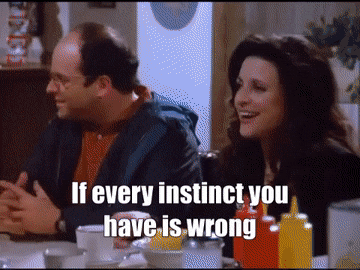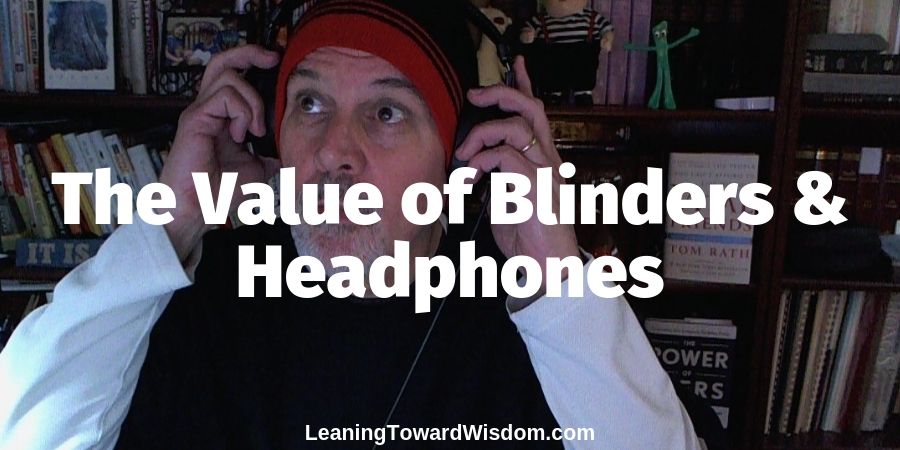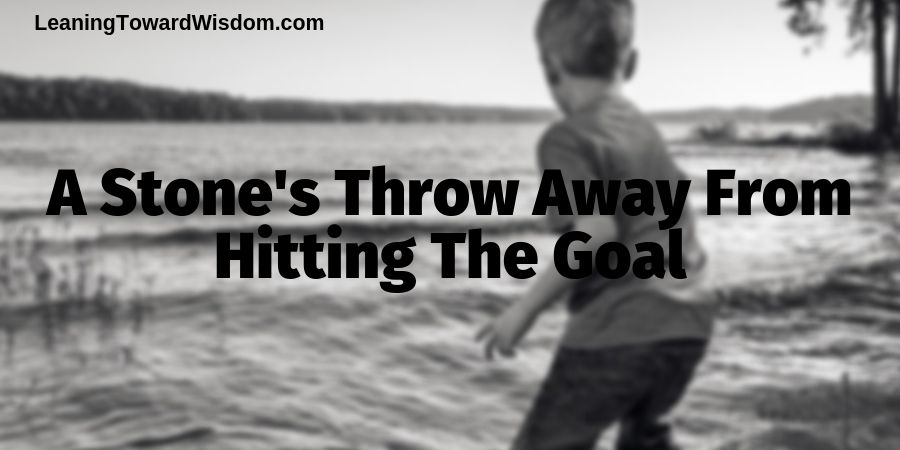Podcast: Play in new window | Download (Duration: 1:24:43 — 97.1MB)
Subscribe: Apple Podcasts | Spotify | iHeartRadio | Email | | More
“All opinions are not equal. Some are a very great deal more robust, sophisticated and well supported in logic and argument than others.” ― Douglas Adams, The Salmon of Doubt
I don’t have a picture of me with blinders on, but I’ve got plenty of photos with headphones on.
I’ve intentionally been leading up to this for a while. My preoccupation for the last year has been learning how humans can be fueled by judgment. We love it. Most of us practice it proficiently. It makes us feel better about ourselves. Superior.
Part of my fascination with watching and learning more about this isn’t because of my own perfection, but just the opposite. I’ve never felt superior to hardly anybody. Ever. I just don’t think like that. I can be like most folks…prone to compare myself to others…but I’m more driven to understand people and spend my time working to figure them out. That’s my worm-hole…observing, learning and trying to figure people out. So people for whom judgment – harsh, critical judgment – comes easily are a mystery to me that I try to better understand.
My journey includes a strong desire to obtain and maintain peace. It’s less about making people like me, but more about working to avoid unnecessary conflict. I’m fond of productive conflict where people vigorously debate viewpoints in profitable ways. That is, when people argue a point with stated reasonings so you can learn why they think what they think. I’m equally unfond of people who want to argue with shallowness. “Why do you feel that way?” — “I just do!” That’s frustrating because it does nothing to help me understand WHY.
I judge people and situations plenty. All the time, in fact. But it’s discernment.
the quality of being able to grasp and comprehend what is obscure
It’s the noticing that I can’t seem to do anything about. I used to try to avoid seeing things. I can’t. In fact, whenever I’ve tried to avoid seeing things it only intensifies my noticing.
I told a young person this week, “The thing I’d urge you to do sooner than later is to rid your life of the toxic, unsafe people in your life. I wish I had begun that process much sooner.”
I currently have very few unsafe people in my life – people who are close enough to me to have any relationship with me. I steer clear of unsafe people because it’s how I choose to live. And if they judge me for it, that’s not my problem. I don’t care.
Which serves to launch forth into the topic of caring. Or more appropriately NOT caring.
How can you stop caring what people think?
Boy do I not have this figured out, but I have made progress through the years. And I’m quite qualified to lay down some logic on you. Unfortunately, it’s the emotional head trash that gets in the way. That stuff overrides logic. But reiterating the logic may help us find a path forward to stop letting the opinions of others – especially the people who don’t matter to us – get in the way of our success.
I’m launching a new initiative that is hopefully going to be 100% of what I do professionally. Operating professional, paid-for, peer advisory groups for leaders. I’m currently working to build groups of SMB (small to medium-sized businesses) owners. Seven people in each group, with me serving as the facilitator.
I sent an email to a few of my Linkedin connections merely to let them know about it and to invite them to learn more. Once in a while I’ll get a reply like this (this is word-for-word what the lady wrote back):
I did not sign up for your emails, please take me off your list.
I made a quick discernment and figured anybody who’d take the time to write that after getting one email, isn’t likely somebody I’d enjoy working with. And I moved on. No, I didn’t respond. I just closed the door behind her, respecting her request.
Years ago that would have gotten into my head. I’d have likely gotten critical of myself and perhaps looked more closely at the wording of the email. Today, I know the wording has nothing to do with it. The offer or information in the email has nothing to do with it. The timing probably doesn’t have anything to do with it. She’s wired the way she’s wired and she sees the world through a very different lens than the one I’m looking through. It’s fine. Her response made me a winner because it gave me a concrete answer. A rejection. That’s a win for me because I know where she stands. And I also know she’s not my cup of tea because I’m not her cup of tea. It’s a big world and she’ll be a good fit for somebody who wants to serve her. Her action only gave me this illustration. Nothing more.
I literally spent 20 seconds opening and reading her email, then deleted her as a 1st connection on Linkedin to ensure that I wouldn’t violate her space again.
Growing from being affected by such a reply to not being affected was a process. One that depended on me thinking logically about what was happening so I could arm myself up to tackle the harder work – the emotional work.
It began when I asked myself, “Why do I care?” I don’t recall the specific thing, but it was likely something as innocuous as this lady’s email response. Nothing hateful. Just a negative reaction. And it sent me down a rabbit hole of trying to figure out how to avoid getting that reaction. I did that for too long. Until I paused my mind long enough to realize the truth of it – I didn’t create that reaction. And that reaction has nothing to do with me.
My intention wasn’t dishonorable. I wasn’t intrusive unless you consider getting an email out of the blue intrusive. I haven’t sent multiple emails. I’ve sent ONE email. Within 3 minutes of hitting send, I got her reply. She did what she did on auto-pilot I suspect. Which means it wasn’t personal. Had nothing to do with the contents of the email. And the only way to find get this response was to do exactly what I did – send her an email. Because here’s the truth. I could have done what I’ve coached lots of salespeople NOT to do. Pre-qualify somebody based on what you think. “They won’t buy.” Or, “They won’t be interested.” Who am I to make that decision for somebody else? That’s her call and I respect whatever decision she makes. That’s the logic of it all.
The story in our head is what gets in our way. We craft a narrative upon which we have little or no evidence. She hates me. She thinks my offer is horrible. She would have responded differently if I had worded it better. On and on it goes. In our head. The story of what went wrong. Where’s the evidence that anything went wrong? There isn’t any.
What worked for me was giving up control.
That’s right. Giving up control thinking I could affect every outcome. That’d be true if I were in charge of everybody’s thoughts and emotions, but I’m not. Some days I struggle with my own. 😉
It’s about giving respect to other people. Enough respect to know they’re going to think whatever they choose to think and they’ll feel whatever they choose to feel. I can only concern myself with my thoughts, feelings and intentions. If others ascribe to me thoughts, feelings or intentions that aren’t accurate, then I don’t worry about it. Sure, I may make an effort – IF I’m afforded the opportunity (which doesn’t often happen with toxic, unsafe, judgmental people). But I just turn the page and close the door behind them after they make it clear they’re going to walk through the door. Closing the door is my obligation to my own life. I get to decide who gets in and who doesn’t. Long gone are the days where I was more interested in doing whatever I could to get people who were inside my life to stay there. Logic taught me that they’re not in control of who gets into my life and who doesn’t. That’s my own responsibility to myself.
It’s the value of blinders and headphones.
It’s really the value of a healthy perspective and focuses on doing right by yourself instead of fretting so much about doing right by everybody else.
Now let’s make one thing clear. Well, I hope to make everything clear, but there’s one thing I absolutely do not want to be misunderstood. This isn’t selfish, self-centered arrogance. Nor is it behaving with chronic displays of ingratitude. Or being narcissistic.
It’s putting in the effort to make sure your intentions are honest. It’s giving proper consideration to the other person. It’s not being as presumptuous as perhaps you’ve been, thinking you can control the other person.
Instead, it’s about giving everybody the freedom to do as they please, even if their choice goes against you. It’s about holding expectations high for yourself while lowering what you expect from others. That was particularly hard for me. Not in a what can I get out of it sort of way, but in a way where I expected people to behave in a certain way.
For example, have you ever been lied to? Or lied about? Well, who hasn’t, right? We’ve all experienced both I suspect. Such behavior would always disappoint me. I thought better of people than that. But I’ve learned not to expect it (although admittedly there are people I do expect it of), but I’ve learned to not be so surprised by it. Or to dwell on it.
The injustice of it used to vex me, but through the years I’ve learned to just accept it. I know it’s not because these people don’t have access to the truth. Or because they lack the opportunity to speak with me directly to know whether or not what they’re saying is true. But because I know they do have those opportunities. Which means I can now discern their dishonest intentions and decide for myself how I’ll respond. I choose not to respond. I choose to ignore it and continue on with my life.
The value of blinders and headphones. The value of not looking at it (more closely) or listening to it. I’ve been working harder and harder to not being able to see it or hear it. I’m not there yet, but I’m confident I’ll make progress toward that end. Part of me is worried that if I push it too far I won’t be mindful, but this past year has taught me that I’m worried for no reason. Because I intend to be helpful and because that’s so important to me…it’s not going to happen. I’m never going to reach a place where I just don’t care what anybody thinks. Ever.
I’ve learned to discriminate. We hear that word used mostly in a negative context, but the fact is we must discriminate. We put limits on all sorts of things. We discriminate with our buying habits if we’re smart. We don’t just go buy everything we may want. Impulsive spenders do and they end up in financial straits. Hopefully, we’re financially responsible, which largely hinges us being discriminating.
We’re discriminating about the people with whom we associate. You don’t likely just invite anybody over to your house? And this exercise of discrimination impacts where you go and the activities you engage in, too.
Opinions.
That’s really what we’re talking about. Opinions other people have of us.
“Most people are other people. Their thoughts are someone else’s opinions, their lives a mimicry, their passions a quotation.”
― Oscar Wilde, De Profundis
Self Esteem.
That’s the other thing we’re talking about. Maybe better said…how you feel about yourself. Specifically, your belief. In yourself.
Too frequently what we believe about ourselves isn’t from us, but from other people. The search for validation from others is a daily, exhausting exercise. Hoping we find people who won’t make us feel worse about ourselves. But more often than not finding people more capable of helping us find a new low in how we feel about ourselves.
You don’t have to be a people pleaser either. That just makes you even more susceptible to the opinions of others, but everybody can be impacted by what others think and say about them.
We worry about what is. We worry about what could be. We worry about what may never be, too.
I subscribe to far too many YouTube channels. Quite a few of them are vloggers (video bloggers) who are professional or semi-professional photographers. It’s not because I’m a photographer or even an aspiring photographer. I’m smitten by their creativity and ability to produce high-quality content.
I just watched a video by one such YouTuber. He had a guest on his show, another YouTuber. A portion of the conversation was one I’ve seen many times before by vloggers. They were in a very public place with lots of people around, both of them shooting video and the guest questioned his host, “How do you do this with all these people around? Aren’t you self-conscious?” The host went on to explain that he gets into a zone and pays no attention to the people around him. Meanwhile, the guest joked about the reason his videos most often show him crouched behind a dumpster or something shooting his videos.
Rather than easily blame this on the difference between being an extrovert or introvert, I’ve seen this conversation many times online among YouTubers. In fact, almost all of them have recorded shows where they confessed they suffered this same malady when they first started vlogging. But the more they do it, the more comfortable they become shooting video and talking into their camera while the world passes by.
The fear of what other people will think is universal. But perhaps so is the habit of doing whatever it is we want to do anyway.
We can be enslaved by what other people think. Strangers mostly. People who mean nothing to us in terms of our having a relationship with them. A vlogger talking into her camera in a public place isn’t surrounded by close friends, but by complete strangers. Why would she care what they think of her? I don’t know, but I understand it. Don’t you?
It defies logic.
We care about these strangers and what they’ll think of us. Mostly, we start making judgments about what they’ll think of us. And it’s never positive. It’s more logical to think a stranger could see such a spectacle and think, “Man, I wish I had the courage to do that.” But we never think that way. Instead, we think they’ll be saying, “Look at that ego-maniac thinking they’re so special they have to record everything in their life.”
We adjust our own thinking to match what these imagined naysayers might think. It curbs our enthusiasm. Not because they do it to us, but because we give them permission to affect us that way. We stop trusting our judgment and begin to rely more on what others think. Well, actually – we rely more on what we think they’ll think of us.
Safety is important and I would never overrate it, but we must keep it on context. I’m all about ridding our lives of unsafe people. They’re destructive to our lives. But that’s not the same thing as living a life that’s too safe – one where we’re fearful to take a step in any direction. A paralyzed life.
When we surrender our life to the opinions of others we crawl into a space where we think we’ll be safe. It’s actually a prison. I’ve never been to prison, but they don’t seem very safe to me. Confining? Yes, but safe? No.
Lock yourself up and throw away the key.
That’s what we do when we value the opinions of others over our own opinion. It’s a no-win game, too. Think about it. Have you lived any part of your life, or perhaps a significant part of your life, trying to please others? How has that worked out? Have you been able to pull that off?
Logically, you know that how you feel about yourself matters most. The trap is basing your own feelings on how others feel. Or what others think. And there’s this…their opinion of you, even if it is negative, is just passing. It’s not other people go around with you on their mind 24/7. But for you, it IS 24/7. Your feelings about yourself rule your life. Momentary judgment by somebody else – even if it’s stated judgment – now has longer-term power because you allowed it. You gave it greater strength and lifespan. This is where stepping back to think through this stuff may help you better realize what’s happening. Realizing what’s actually happening can serve us to figure out ways to curb it. Maybe even stop it altogether.
Shutting out other people’s opinions is key. And much easier said than done.
Permit a brief sidetrack about social and emotional intelligence. We used to just call it “people skills.” Reading cues from others and knowing how to respond in ways that foster safety and comfort – that’s the skill. You can’t exercise such skill with your eyes and ears closed. Greater awareness of your surroundings and the people in them provide you with the necessary information to figure out how to best respond. Or not (if you lack social awareness).
I’m thinking of somebody I know who has poor social awareness, but he’s unaware of it. He responds to almost all situations with awkward attempts at humor. I watch it from a safe distance with amazement that he can’t seem to find the bravery (or whatever it may be) to just remain silent and listen. But I’ve seen this before. Many times. Social awkwardness that results from the inability to properly read people or the situation. It prompts awkward responses.
We certainly don’t want that, but that would be the result if we completely shut out other people’s opinions. For me, the brain drain has been my naturally leanings toward heightened awareness – the downside of being a noticer. Like I said before, every time I try to curb my noticing it works in reverse to elevate it. I’m better off just behaving as naturally and not giving it more attention.
According to Healthline.com…
A sociopath is a term used to describe someone who has antisocial personality disorder (ASPD). People with ASPD can’t understand others’ feelings. They’ll often break rules or make impulsive decisions without feeling guilty for the harm they cause.
The upside of being a sociopath is you’re able to completely ignore the opinions and feelings of others. Well, none of what that.
How in the Sam Hill can we fix this mess? What can we do so our lives aren’t ruined by how much credence we give to others?
I’ve hinted at one big problem. It’s not necessarily the opinion of others. It’s the opinion we project on them. It’s what we THINK they’ll think. This is our own head trash.
The vlogger embarrassed to shoot in front of a public crowd is projecting his own fears on the people in the crowd. He doesn’t know these people. He knows nothing about them. But he’s able in a nanosecond to assert that they’re thinking negative things about him because he’s talking into his own camera. Those are his fears, not theirs.
That’s as a good a place to start fixing this as any. To understand that we’ve met the enemy and he is us.
The paradox is that the judgment we hope to avoid is being intensified. And we’re the guilty party. We’re the ones judging what others will think, feel or say. That judgment drifts over into us judging ourselves based on how we’re judging others.
Is that fair?
No. It’s not even logical. Or probable…that everybody who sees the vlogger will think something negative. Truth is, most people won’t notice or care. They’re busy going about their own day. Others are more likely to find it interesting. The vlogger’s fears are being projected onto every single one of them though and that causes him to shrink and vlog with less enthusiasm.
“What will THEY think?”
We’ve all said it. And wondered about it. As fond as I am of questions, it’s a really poor question. It’s a question that serves no useful purpose.
What we’re really saying is that we’re fearful of the judgment of others. Again, what purpose does that serve? Suppose the judgment is as critical as we fear. I’ve got another question, “What difference does it make?”
The word is “embarrassment.”
Have grandkids or children in your life and you’ll soon be engaged in a study of embarrassment. Five grandkids fill my life. Each are very different. Some are boisterous and outgoing. Others are more reserved. But they’re all prone to embarrassment about SOMETHING. It’s fascinating how one thing can embarrass one of them and not faze the others. It’s cute in kids. It’s sad in adults.
What is embarrassment?
a feeling of self-consciousness, shame, or awkwardness
Psychology Today has this to say about it…
Embarrassment is a painful but important emotional state. Most researchers believe that its purpose is to make people feel bad about their social or personal mistakes so that they don’t repeat them (thus benefiting the larger society), and its physiological side effects—like blushing, sweating, or stammering—may signal to others that someone recognizes their error and is not cold-hearted or oblivious. In fact, studies have shown that people who act embarrassed after committing a “bad act”—like knocking over a store display—are perceived as more likable than those who don’t, regardless of whether or not anything is done to make amends for the mistake.
Someone can also feel embarrassed on behalf of other people, a phenomenon known as vicarious embarrassment. Shame is another “self-conscious emotion” in the same category as embarrassment; it’s often deep-seated and related to self-esteem, and can be felt even when no one else knows about real or imagined slip-ups. Guilt is a similar emotion to both shame and embarrassment, but unlike either, it tends to focus specifically on what one has done, rather than who one is.
Embarrassment isn’t all the same. The vlogger is embarrassed even though nothing has happened. He’s done nothing. The crowd around him has done nothing. He’s embarrassed because of fears in his head.
That’s hardly the same thing as standing up in front of people with your fly unzipped. Discovering such a thing causes embarrassment which serves you in the future. Make sure your pants are zipped up so it doesn’t happen again.
It’s that social awareness stuff – people skills – we talked about earlier. We learn how to respond properly to people and situations.
When we let the opinions of others – mostly, the opinions we fear they’ll have – stop us, then we’re allowing our embarrassment to imprison us. It’s embarrassment without any evidence. No unzipped fly. Just fear in our head.
It’s different. But the same. We don’t want to be embarrassed.
Think about the last time you were embarrassed. What happened?
I’ll tell you mine. I walk. Quite a lot. In the middle of the night. Don’t ask. I sometimes live like a vampire. Not on a quest for blood, but I often come alive at night. 😉
I often walk by some baseball fields. As I walk around the fields, especially on the backside, I pick up baseballs that have been hit over the fence. I’ve got about 150 baseballs from just this summer.
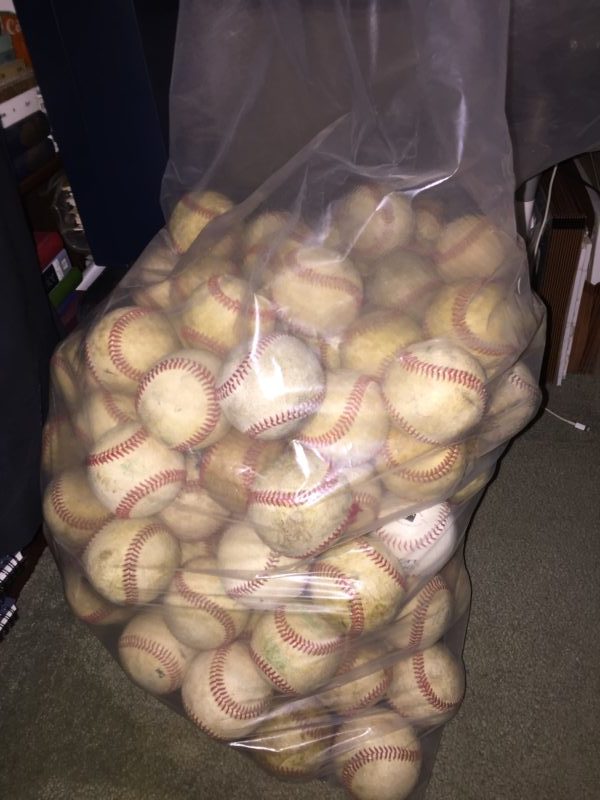
The other day I collected a record number of baseballs. I carried a little fishnet bag to put them in. It’ll hold 8 or so. Well, I found 18 balls. EIGHTEEN!
I crammed 9 or 10 into the bag. The bag started to rip. Refusing to leave any ball behind, I grew embarrassed at what others might think. Here’s what’s stupid about it. Well, honestly, everything is stupid about it. But this is true confession time.
This was early in the morning. We’re talking about very few people being out. But the walk from behind the ball fields means walking between two dog parks (big dogs on one side and smaller dogs on the other – with a sidewalk going between them). At most there may be one person with a dog in one or the other. These dog parks aren’t fully occupied so early in the morning. But I began to be embarrassed carting all these baseballs around.
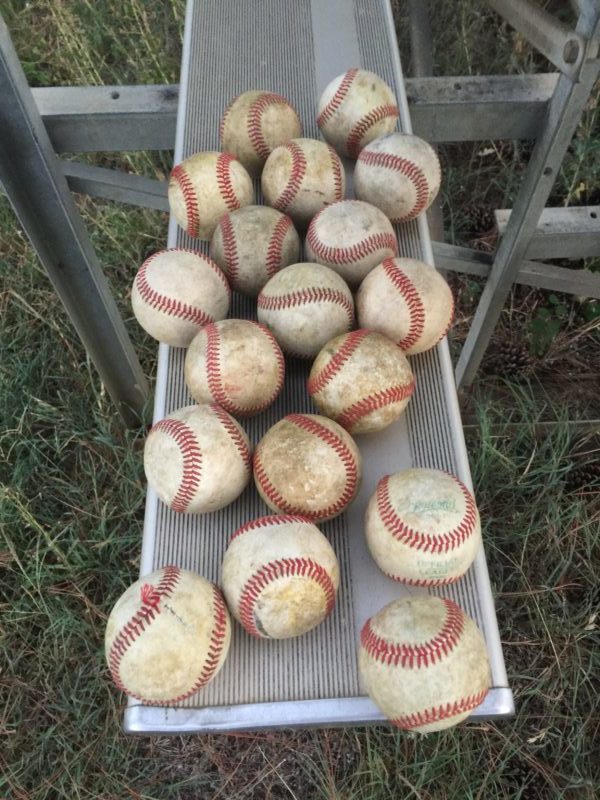
Think of this. A grown man. An old man. On an early morning walk. Collecting all these baseballs. Walking around with a fishnet bag full of them, which means you can see I’ve got baseballs. And in each hand, I’ve got 3-4. What kind of freak is this walking around our neighborhood? Oh, that’s the crazy old man who lives over there.
I did what you do. And what everybody does. I didn’t stop to face that fear or embarrassment, even though I did stop long enough to take that picture of the 18 balls. A record-setting walk.
Once I got between the two dog parks I started grinning broadly. The thought struck me, what if I behaved excited about this record-setting walk. It was funny to think about shouting, “Hey, look how many baseballs I collected this morning!”
Here’s the fact. The truth. It’s not a big deal.
It illustrates how our minds can work against us though. If I can fear embarrassment about walking around with 18 baseballs, then I can fear just about anything, right? Quit laughing at me. You’re no better! 😀
We’re all ninnies. Sometimes.
Do you know how freeing it is to not care what people think? Sure you do. Now let’s think of a time when that happened. Besides, we need to counteract thinking of a time when we were embarrassed. So think of a time when you just didn’t care what anybody thought. Maybe it was because you wanted something badly enough it didn’t matter. Maybe it was because you stopped and thought long enough about how ridiculous you were being. It doesn’t matter. Just think of a time. Remember how liberating it felt?
I’ve been in quite a few workshops or seminars where participants were asked to present in front of the group. It always starts off, “Who wants to go first?” Some ballon-headed ego maniac tends to leap up hoping to show off. 😀
By the time it gets around to the third or fourth person, I’ll raise my hand. In those situations, I just don’t give a care what anybody, especially the people in charge, thinks. I’m pretty confident on my feet and logic tells me (based on evidence) that I’m fairly competent in such moments and evidence also tells me nothing bad is going to happen. It helps that I’m able to laugh at myself. In fact, I’m usually the first to do it. So I figure if I get up and my fly is unzipped, I’ll point it out, zip up and remind any gentleman in the audience, “Check your zippers right now!” I guarantee I’ll have every man check his pants.
It’s beyond liberating. It’s rather exciting. I’d say it’s even FUN.
That’s the evidence speaking. Not head trash. Not fear. Not worrying about what others will think. You know what it really is? It’s control of your own life. That’s the exciting part.
The value of blinders and headphones is just a metaphor for putting a stop to comparing yourself to others. We look at what others are doing. We listen to what they’re doing.
I’ve been podcasting for many years. I’m not successful by any measurement that most people care about. I don’t make money podcasting. I don’t have a big audience. I’ve never tried to game the system. I don’t care. When I began I never expected any of those things. It’s not because I didn’t think I could do it successfully. It’s because those weren’t the drivers for me then, and they’re not the drivers for me now. I know and keep up with the space. I know more about podcasting than most people ever will. Because I started early and I’ve stayed with it. I love doing it and I think I’m capable. I’ve also gotten better because I’ve put in the work.
I bring that up because this is one endeavor where I just don’t care what others think. I never have. I care about YOU. I care about bringing value to you. I hope I make some meaningful difference in your day or week. To have a meaningful impact on your life is a big ask and I’m not sure I’m capable of something that grandiose. 😉
Would I like to have more of you listening? Sure, but I spend no time trying to crack that code with format changes, length of shows, release days, cover art, social media promotion or anything else. It’s pretty organic around here, which is why my audience is limited – and why I’m good with it. We’re like a small club and that suits me.
I’m part of the podcasting community and have been for 20 years. I still get tickled at people in forums and groups clamoring to get into Apple’s New & Noteworthy. Or people with four episodes wanting to figure out to make money. I don’t disrespect them. I just don’t care. And I really don’t care about the Joe Rogans or other super successful podcasters who are able to make tons of money in their podcasts. Good for them. I’m not them. And I’m good with it.
Fact is, I spend NO TIME comparing myself to other podcasters. And I can’t really explain it. How am I able to get up in front of a group of strangers at a workshop or seminar and not care? How am I able to podcast week after week for years on end and not care? How am I NOT able to walk around with 18 baseballs without caring? Makes no sense.
Welcome to the human race and the power of our mind. Captured by our own thoughts. Thoughts we clearly can control if only we would.
Few things have proven as strong as a mind made up.
I’m not remotely tempted to compare my podcasting to anybody else. It started that way and if anything, it’s just grown stronger through the years. Maybe the key is I began it that way.
Here’s what we all logically know is true. Everybody has their own head trash. Everybody has their own worries, troubles and fears. We THINK everybody is watching us, but even as I walk between the dog parks with 18 baseballs, the reality is all those people with dogs in the park are fixated on their lives. Turns out there weren’t many people in the park at that hour of the morning, but even if the parks were packed…I’d have largely gone unnoticed. That’s the truth.
It doesn’t feel that way in our head though.
Free yourself from others. Stop fretting about what other people MAY think. Quit running from your fear and face it. Because it’s pointless. Fear truly does mean False Evidence Appearing Real. No evidence. No logic.
The evidence is that what Joe Rogan does in his podcasting glory and success has no bearing on my podcasting endeavors. Zero. But I could become fixated on his success – or anybody else’s success – and let it impact how I feel about my own efforts. Again, what use would that be? How would that help me grow or improve? It wouldn’t!
Who are you comparing yourself against? Don’t answer that. It’s likely an enormous number that includes people you know well, people you barely know and people you don’t know at all. It’s EVERYBODY.
Let it go. Today.
In the past 40 years, parents have grown increasingly focused on the self-esteem of their children. It prompted the “everybody gets a trophy” fakery that has provided such entitlement that now workplaces are challenged with people who can’t deal with the realities of adversity. So many kids grew up in fake environments where they were overly protected from real-world consequences like LOSING.
This doesn’t mean self-esteem isn’t important. It’s very important. It can’t be based on how you stack up against somebody else though. So all the kids get medals or trophies…it doesn’t make you a winner. And it’s proven it doesn’t give you true self-esteem either. It makes you weak, unable to face the realities of losing, something we all experience! Parents tried hard to fill their kids with self-esteem by bragging on their every endeavor and protecting them from knowing they sucked at something. Didn’t work. Won’t work.
Self-esteem comes from self.
It sure doesn’t come from having too high a value of how others view you – collecting trophies. Parents can figure out the right strategy. I’m not trying to tell you how to parent. I know my parenting, which ended a few decades ago, didn’t give any consideration to what other people thought. Just another area where I had no trouble ignoring the opinion of others.
I’m only making observations about what I know business leaders are facing today with workers entering their companies. Young employees who have never been told the truth and now find it difficult to handle any criticism intended to help them become better. They just want to be bragged on and many find it tough to handle anything else. Plus, many need constant validation that they’re doing a good job. Why? Because self-esteem parents thought they were building didn’t happen. Instead, external validation became THE important driver in their kids’ lives.
This is where we have to deploy enough ego to serve ourselves. It’s also where we have to stop waiting for others to help us with it. Nobody is coming to fill you up with self-worth. Nobody.
Psychologists tell us to start feeling better about ourselves without regard to how others feel about us. Well, okay. Nuff said. 😀
How?
I can only share what I think serves me. Let’s see if it helps you.
For me it starts with the behavior I’m proud of. If I’m ashamed of myself, that erodes my self-esteem. It feels right. I mean, if I misbehave I don’t want to feel good about it. I want to feel appropriately ashamed so I grow and behave better.
Character is the thing. The rules of how I’m going to live. As a Christian, that’s not some moving target. It’s fairly defined, established by the Bible. What’s left is for me to compare my life not to somebody else but to what God dictates in the Bible. If I measure up, then I’m on track. If I don’t measure up, then I need to make some changes.
The big thing for me is intent. I have to work daily to make sure my intentions are where they should be based on the life I’m professing. I wish I could tell you that 100% of my days have well-placed intentions that are congruent with my faith. But that’s not true. What is true is that I always work (some days not nearly hard enough) to course correct. So I could argue that 100% of the time I’m focused on my intentions. Either fixing them or knowing they’re where they belong.
That speaks directly to my self-esteem. I can live with reasonable assurance that I’m trying to live a better life – a life dictated by faith. What does any of that have to do with others? NOTHING. I know that. So I also know my self-esteem in this regard is steeped in my commitment to my faith. That commitment is my own. Just like my self-esteem.
There are other areas of my life where validation is meaningful. That’s what project #CravingEncouragement is all about. It’s the power of our ability to express belief in somebody. It’s important. I’d never undervalue it. But it can’t replace or displace how you believe in yourself. It can enhance it. Grow it.
This is where boundaries are necessary. It’s why I’m intent on ridding your life of toxic people.
People filled with harsh judgment. People who tear others down so they can elevate themselves. People who are dishonest. Unreliable. Untrustworthy. Unsafe people.
Get away from these people. Don’t let them into your life.
Simple.
Maybe not easy, depending on who they are, but simple. And the most powerful thing you might do for yourself. Build a wall to keep those people out of your life. Or risk having them come in to destroy all the good you would do, or be. You’ll likely feel free and better once you show those folks the door.
Humility is easy for me. I’ve just never felt like I was what the world was waiting for. I’m daily tickled by people willing to state their ambition is to “change the world.” Perhaps it’s because of my faith. Maybe it’s because I learned defeat as a kid. Maybe it’s because of when I was born. But for whatever reason, I’ve never had too high an opinion of myself. And I don’t mean I’m down on myself. I just mean I don’t walk into any room and think, “Yep, I’m the smartest guy here.” NEVER.
Part of humility is gratitude. I’m thankful for who I am and where I’m at. I’m thankful for the people who invested time and effort in me to help me become who and what I am. But I realize I used these resources. It’s on me. Owning it just isn’t problematic for me.
The good. The bad. I’m happy to own it all. Shoot, I’m even happy to own stuff that doesn’t belong to me. Somebody smarter than me will have to explain that, but it’s easy for me to accept blame. Maybe because it’s easy for me to sincerely apologize. It’s my life and I figure I can live it as I want. So mostly I do what’s natural, easy and comfortable as far as my character goes. That is, I’m not spending any time trying to be somebody I’m not.
Being true to yourself likely has someplace in this conversation. It’s your life. I’ve got my own. And frankly have my hands full with my own so I can’t be too bothered by trying to live yours for you. Yes, I know there are people who will happily tell you how to live. Opinionated people who must foist their opinions on others. BOUNDARIES, remember? I don’t let those people into my life. At most, I tolerate limited interactions with them only as needed. And I actively search for ways to avoid any interaction with them.
You have to own your life. Not as a victim, but as a captain.
If it were a math equation it would be simple. List all the opinions of others. Real or imagined. Now list your opinion. The sum of all the other opinions adds up to ZERO. Your opinion has some value greater than zero. That’s just how it is, whether you realize it or not. Today’s show intends to help you better realize it.
A mind made up.
I just have no better answer or solution. To make up your mind that nobody’s opinion is going to matter as much as your own. To commit yourself to yourself.
It’s not about living in solitude or loneliness. Nor is it about avoiding surrounding yourself with great people who can serve you well. Contrary, it’s about putting in the work to be more intentional about that work. To forget about fear and failure so you can live your best life. To be around people who can help fuel that drive.
What if I get up in front of people with my fly unzipped? What if I fail?
Well, I’m gonna learn. That’s what. I’m gonna figure it out.
I’ll zip up my pants. Make a joke. Make sure all the guys look at their own pants. Laugh. And move on.
I’ll work harder to create a moment of learning. A memory that serves some purpose other than me feeling bad about myself. How is the universe benefited by me feeling bad about myself? Especially when I had the opportunity to make a more positive moment from it?
What’s the alternative? Never get up in front of people again for fear my fly may be unzipped?
Care less. And do it with enthusiasm. Next time I may give that topic a go – enthusiasm. I’m now getting pretty fascinated by the power of that.
But that’s for later.
For now, find value in putting on blinders and headphones. See what you want to see. What you need to see so you can become a better person. Listen to what you want to hear. What you need to hear so you can grow into a better human.
It’s about being your best. And refusing to let anybody or anything stop you.
It’s about doing the thing you’re most fearful of doing. The shy vlogger should vlog daily in public in front of people and he’ll quickly get over it. You should stop paying attention to everybody’s opinion over your own. The more you do it, the more quickly you’ll realize it only had power you gave it. When you stop fueling it, its power goes away. And then you can soar.
Randy
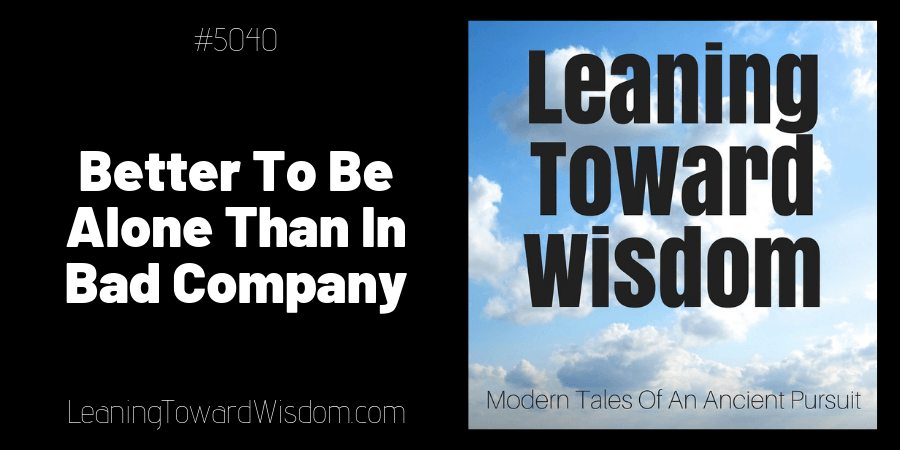

 Visit
Visit 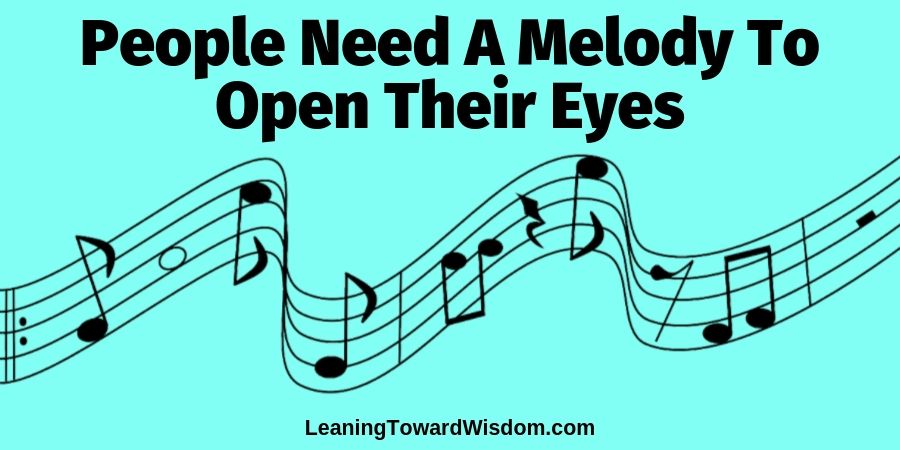
 Thirty-nine years today – around 6 am – August 17, 1980, a Sunday morning – we had a baby boy. We named him Ryan Dale. And it changed our lives forever. In all the best ways. We were now parents.
Thirty-nine years today – around 6 am – August 17, 1980, a Sunday morning – we had a baby boy. We named him Ryan Dale. And it changed our lives forever. In all the best ways. We were now parents. My son makes me better in every way and provides a profitable melody that has definitely helped open my eyes through the years. Lord willing, we’ll have many more melodies yet to come.
My son makes me better in every way and provides a profitable melody that has definitely helped open my eyes through the years. Lord willing, we’ll have many more melodies yet to come.

